Some documents are made available in PDF format. You will need Adobe Reader to view them. 
![]() [ abridged PDF version for viewing, 598K
]
[ abridged PDF version for viewing, 598K
]
![]() [ abridged PDF version for printing, 1.6M
]
[ abridged PDF version for printing, 1.6M
]
- Director’s Message
- Ben Sperry Named UTCM Student of the Year for 2008
- Mr. Sperry Goes to Washington
- Spotlight on Technology Transfer: UTCM Symposium Paving the Way for Road User Fees as a Gas Tax Alternative
- Spotlight on Research: Mapping Growth Policies in the Texas Urban Triangle
- Spotlight on Education: Graduate Certificate in Transportation Continues Path of Growth
- Transportation Certificate Program Launches Seminar Series
- Mobility Colloquium Serves Variety for Lunch
- Completed UTCM Projects
Director's Message
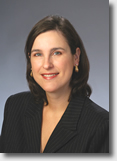
Melissa S. Tooley,
Center Director
Business as usual? Not this reauthorization cycle! It seems that the culture of change that is permeating Washington these days is going to substantially impact the debate on the next transportation authorization bill. In fact, some key players are calling it an authorization bill, not a reauthorization bill because the very structure of the legislation is up for discussion.
One of the topics being addressed with greater urgency is transportation finance, with mileage-based user fees just one of the innovations being considered seriously for implementation. The legislative process is being made more transparent, with greater accountability for lawmakers and those benefiting from designated funding. There is a greater emphasis on performance measures to provide ways to determine whether infrastructure and policy improvements deliver to the public as promised. And, as congestion on our nation’s highways continues to deteriorate our quality of life, congestion pricing and other ways to mitigate congestion and get the country moving are being implemented more frequently.
UTCM is on the leading edge of all of these issues. The Focus Areas that guide UTCM’s programs are directly applicable to many of the topics that are foremost on decision-makers’ minds. Given that, it is important that we continue to provide the information necessary for good decisions, whether that information comes from the Urban Mobility Report, our recent conference on Mileage-Based User Fees (p. 1), our ongoing research on climate change and its impact on transportation policy, or our research in performance measures for transportation infrastructure.
What this culture of change will mean for the University Transportation Centers Program is unclear at this point. It is crystal clear, however, that the requirement for increased accountability will extend to UTCs now and in the future. UTCM is ready for the challenge.
Responsibly Yours,
Melissa S. Tooley
[ Top ]
Ben Sperry Named UTCM Student of the Year for 2008
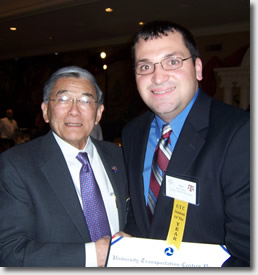
2008 UTCM Student of the Year Ben Sperry is congratulated by former US Secretary of Transportation Norman Y. Mineta.
In December, the UTCM selected its 2008 Student of the Year, Mr. Ben Sperry. Ben is a PhD candidate in Civil Engineering who is also pursuing a Graduate Certificate in Transportation Planning developed by the UTCM. Mr. Sperry also holds a UTCM Fellowship and was a SWUTC Undergraduate Transportation Scholar. He has a perfect 4.0 average in his graduate career and brings interdisciplinary insight to both his studies and his research.
As part of his award, Ben attended the TRB Annual Meeting in Washington, DC in January. He tells of his experiences in the following article. Congratulations, Ben!
[ Top ]
Mr. Sperry Goes to Washington:
A Student's Perspective on TRB
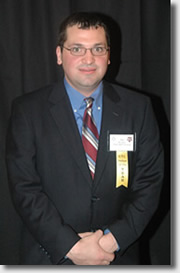
Ben Sperry at the CUTC Awards Banquet
by Ben Sperry, 2008 UTCM Student of the Year
Like many of my fellow students, I look forward the TRB Annual Meeting each year. But this year’s TRB Meeting was particularly special for me as I was honored to attend as the 2008 UTCM Student of the Year.
I was invited to an awards celebration hosted by the Council of University Transportation Centers (CUTC) held just before TRB. The program included a reception and banquet, a keynote video speech by California Senator Barbara Boxer, and presentation of the SOY awards. At the event, I was able to network with fellow SOYs from UTCs across the country as well as professionals from all areas of the industry and academia. The biggest thrill of the evening for me was shaking the hand of former US Secretary of Transportation Norm Mineta. I was also fortunate to have my parents accompany me to the awards celebration. My mom snapped the photo above of me with Mr. Mineta.
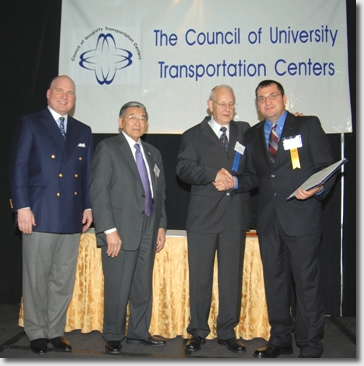
2008 UTCM Student of the Year Ben Sperry receives his award from Former RITA Administrator Paul Brubaker, Former US Secretary of Transportation Norman Mineta and CUTC President Randy Machemehl.
I spent the next five days immersed in the 88th Annual TRB Meeting. I attended presentations on the topics of land use and greenhouse gas emissions, passenger train performance, paradigm shifts in commuter rail, and intercity bus transportation. In the numerous poster sessions, I networked with the authors and began developing my own ideas for research. A new experience for me this year was attending committee meetings on intercity passenger rail and transportation in national parks; I learned a great deal about their research agendas and also how the TRB committees are structured.
As a graduate student, TRB represents an opportunity to grow my own career and explore the many facets of our great profession. Thank you UTCM for this honor and for this TRB experience!
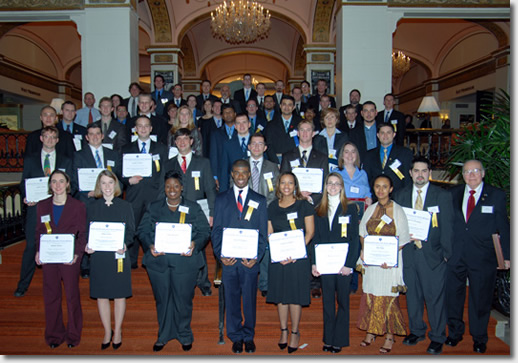
2008 UTC Students of the Year from across the country
[ Top ]
SPOTLIGHT ON TECHNOLOGY TRANSFER:
UTCM Symposium Paving the Way for Road User Fees as a Gas Tax Alternative
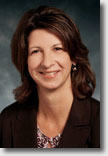
UTCM Researcher
Ginger Goodin
Project Title: "Mileage-Based User Fees: Defining a Path Toward Implementation"
Principal Investigator: Ginger Goodin (Research Engineer, System Planning, Policy and Environment Research Group, TTI Austin Office)

With funding from the UTCM, TTI researchers Ginger Goodin and Trey Baker hosted a symposium in April on mileage-based user fees in Austin, TX. Co-hosted by the UTCM, TTI, the Humphrey Institute of Public Affairs, the Center for Transportation Studies, IBM, Central Texas Regional Mobility Authority and PBS&J, this symposium brought together professionals in the field of road user fees to share information and advance the discussion of user-based fees as a potential replacement for the fuel tax.
Representatives from past, current and upcoming pilot studies and implementations presented lessons learned and key study topics from their projects. Panel discussions addressed specific topics such as legislative and policy issues, public acceptance challenges, potential technology applications, and institutional issues. The symposium incorporated interactive discussion sessions on logical next steps as well as the associated challenges and opportunities.
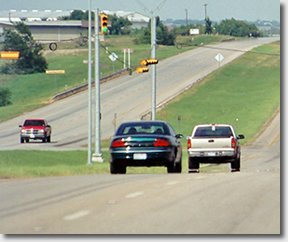
Participants’ reaction to the symposium was positive; feedback noted that session speakers were well-informed and represented a broad array of backgrounds and perspectives. The conversation circle, moderated by Bob Johns of the University of Minnesota and Katie Turnbull of TTI, received especially high praise from attendees who enjoyed having to take the "hot seat" and present their views.
The symposium opened extensive debate about road user fees and there was strong (cont. on page 4) optimism that the event will lead to positive action on the part of federal and state officials.
Following the symposium, Goodin and Baker have continued the outreach effort, keeping attendees informed on developments via the MBUF website, http://utcm.tamu.edu/mbuf/. The site includes event materials such as audio and video of the presentations and links to MBUF studies and discussion on the topic. The site also offers registration in an ongoing listserv to link those discussing MBUF topics and to disseminate MBUF news articles and other data. These resources will allow the UTCM and TTI to continue advancing the MBUF discussion, and they position UTCM as the "go-to" organization on this hot topic.
For more information, visit the Mileage-Based User Fees website at
http://utcm.tamu.edu/mbuf/.
This symposium was made possible with financial support from:






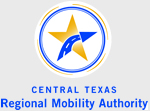
[ Top ]
SPOTLIGHT ON RESEARCH:
Mapping Growth Policies in the Texas Urban Triangle
Project Title: "Texas Urban Triangle: Creating a Spatial Decision Support System for Mobility Policy and Investments That Shape the Sustainable Growth of Texas"
Principal Investigators: Michael Neuman, PhD, AICP (Associate Professor, Department of Landscape Architecture and Urban Planning)
Elise Bright, PhD, AICP, DED (Professor, Department of Landscape Architecture and Urban Planning)
Curtis Morgan, Program Manager, Multimodal Freight Transportation, TTI
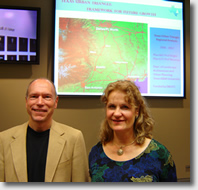
UTCM Researchers Michael Neuman and Elise Bright

Dr. Curtis Morgan
With severe and wide-ranging implications for the future, UTCM researchers Dr. Michael Neuman and Dr. Elise Bright are investigating the Texas Urban Triangle (TUT). "This urban mega-region bounded by the cities of Dallas/Fort Worth, Houston and San Antonio has become one of the most dynamic areas in the world," says Associate Professor Michael Neuman of Texas A&M University’s Department of Landscape Architecture and Urban Planning. "With 17 million people living in this region, it’s home to 80% of Texans." By 2030, the Texas Urban Triangle could swell to 25 million residents.
Neuman and Bright and their Texas A&M graduate students are building on the results of a comprehensive study funded by the Southwest Region UTC (SWUTC), which led to a 140-page report titled Texas Urban Triangle: Framework for Future Growth. In that study, they researched key strategic factors shaping the future growth of the mega-region, including current and future needs for water, energy, housing, education, transportation and more. The SWUTC study shows that without serious planning, the Texas Urban Triangle will develop social, economic and environmental problems. Almost all of the issues have transportation implications. Neuman explains, "Areas within the TUT consist of fertile and productive farm land. Do we really want to build roads over it?"
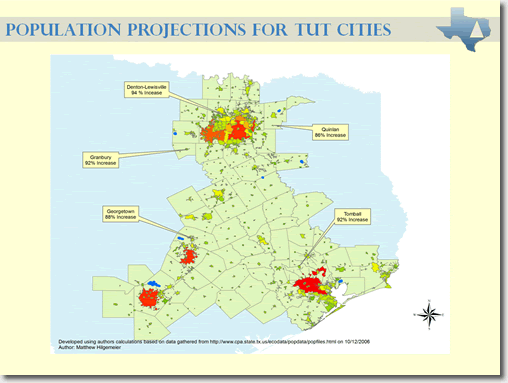
The Texas Urban Triangle is an area of explosive growth, bounded by the cities of Dallas/Ft. Worth, San Antonio and Houston.
"In the UTCM project, we are developing a comprehensive approach to tackle these issues," Bright says. "We will provide an important tool for educating decision makers in their planning for TUT and Texas." And the research findings from the UTCM project are likely to be useful in planning for other urban growth areas in the country. "We need to build political support for future planning. What will the Texas Urban Triangle look like in 20 years if we don’t do anything to guide it?"
More information this project is available on the UTCM website under "Projects: Research Projects" and also in the Mobility Colloquium article below.
[ Top ]
SPOTLIGHT ON EDUCATION:
Graduate Certificate in Transportation Continues Path of Growth
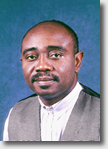
UTCM Researcher
Forster Ndubisi
Project Title: "Developing an Interdisciplinary Certificate Program in Transportation Planning"
Principal Investigator: Forster Ndubisi (Professor and Head, Department of Landscape Architecture and Urban Planning, Texas A&M University)
Since its inception in Fall 2007, the Graduate Certificate in Transportation Planning, led by Dr. Forster Ndubisi and Certificate Administrator Dr. Eric Dumbaugh, has met with increasing success. Phase two of the funding for this program targets further development of curriculum, publicity, recruiting materials and enrollment/graduations.
After the first student matriculated in Spring 2008 with a certificate awarded through the College of Architecture, the certificate was approved by Texas A&M President Elsa Murano to be awarded by the university. As of May 2009, nine students have graduated with the certificate and nine more are scheduled to graduate by May 2010; two additional students are enrolled in the certificate program.
Three new courses for the certificate program have been developed with UTCM funding, and cumulative enrollment in certificate courses totals 115. Eight scholarships have been awarded to meritorious students enrolling in the certificate program and 10 more scholarships and one assistantship are targeted to recruit outstanding students to the program in the next academic year.
As an additional technology transfer component of the program, Ndubisi and Dumbaugh established the Transportation Symposium Program, holding the first lecture in March 2009. Dan Burden, the Executive Director of Walkable Communities, Inc. in Orlando, FL, spoke on the future of transportation and community design. More information on this lecture is found in the following article.
Additional information on this program may be found on the UTCM website under Projects: Tech Transfer Projects.
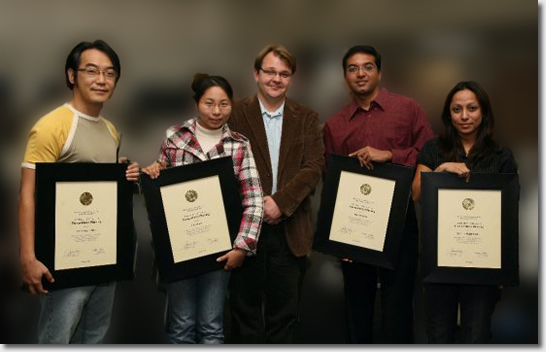
December 2008 Transportation Certificate Graduates (l to r) Hwa Young Kim, Jun Huang, Certificate Administrator Eric Dumbaugh, Nitin Warrier and Subrity Rajbhandari (not pictured: Munmun Parmar)
[ Top ]
Transportation Certificate Program Launches Seminar Series
As an additional technology transfer component of the Graduate Transportation Certificate program, UTCM Researchers Forster Ndubisi and Eric Dumbaugh established the Transportation Symposium Program, holding the first lecture on March 31, 2009. Dan Burden, the Executive Director of Walkable Communities, Inc. in Orlando, FL, spoke on the future of transportation and community design.

Dan Burden is a nationally recognized authority on bicycle and pedestrian facilities and programs. He brings together many disciplines and issues (street design, traffic calming, public safety, bicycling, and greenways) into a holistic vision for creating healthy, pedestrian- and bicycle-friendly communities.
Burden has spent the last thirty years developing, promoting, and evaluating alternative transportation and sustainable communities at national, regional, state, and local levels, and he is the founder of Walkable Communities. Time magazine has identified Burden as one of the six most important civic innovators in the world, in recognition of his efforts to create better places to live, work, and play.
[ Top ]
Mobility Colloquium Serves Variety for Lunch
The UTCM sponsored three more of its popular lunchtime lectures, offering a smorgasbord of cross-discipline research topics designed to build discussion and foster the synergy that leads to innovative research.
More information, slides and photos for these and other Mobility Colloquia can be found on the UTCM website under "Mobility Colloquium."

Drs. Michael Neuman and Elise Bright
01.26.2009
"The Texas Urban Triangle: Framework for Future Growth"
Michael Neuman, PhD, AICP, Associate Professor and
Elise Bright, PhD, AICP, DED, Professor, Department of Landscape Architecture and Urban Planning
Drs. Bright and Neuman reviewed findings from their recent SWUTC-funded research on The Texas Urban Triangle (TUT) and their current research funded by UTCM. The TUT comprises the metropolises of Dallas-Fort Worth, Houston, San Antonio, and Austin and represents the most rapid growth occurring in the urban state of Texas. The Triangle is home to over 17 million people, almost 70% of the state’s population, and this figure is predicted to expand to over 80% in the next 20 years. The Texas Urban Triangle is singular, new, complex, and important.
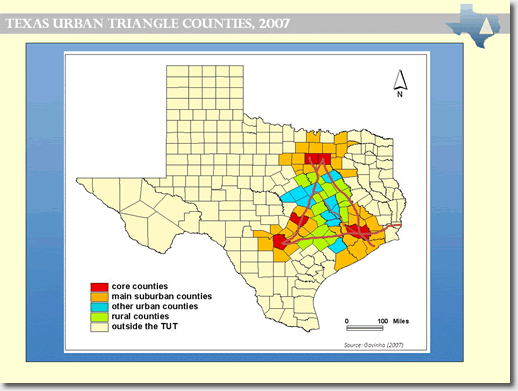
Slide from Drs. Neuman and Bright's talk showing the region known as the Texas Urban Triangle.
The impacts of growth, both positive (new homes, new jobs and businesses, new transportation and infrastructure networks) and negative (less farm and ranch lands, increased pollution) are easy to predict based on past experience. How we handle this new growth in the Texas Urban Triangle will determine to a large degree whether Texas continues to prosper and enjoy an affordable, high quality of life.
With funding from UTCM to continue their research, Drs. Neuman and Bright will address four basic research questions in the Texas Urban Triangle, from which a framework for future growth may be developed:
- Where should the growth go in the future?
- What are the impacts of that growth?
- Are those locations vulnerable to hazards both natural and human?
- What scale/type/location of infrastructures are necessary to support growth?
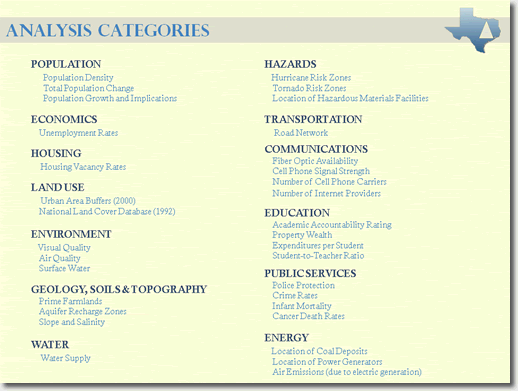
Slide from Drs. Neuman and Bright's talk showing categories affected by growth that are being studied in their research on the Texas Urban Triangle.
03.02.2009
"Logistics for Public Freight Planners: Theory and Practice"
Bruce Wang, PhD,
Assistant Professor
Zachry Department of Civil Engineering
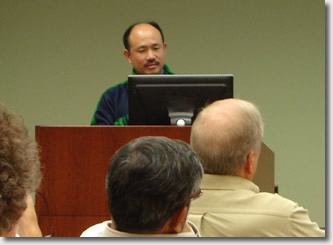
Dr. Bruce Wang presents his Mobility Colloquium
Making sure deliveries make it to their destination on time has never been more important to the private sector logistics practitioner. Freight logistics are driven by business strategies, and in turn, logistics drive the flow and ebb of freight traffic on the transportation system. In his presentation, Dr. Bruce Wang demonstrated the big picture of the supply chain, reviewed the rapid progress in theories and practices of logistics and supply chain management, and discussed new technologies that have impact on logistics practices.
"There is a great need for improved public freight planning by better understanding and applying logistics practices," Dr. Wang emphasized. The presentation was based on a short course developed by Wang and his colleagues at the University of Wisconsin.
04.06.2009
"A New Vehicle Design for Rural and Urban Patient Transport"
Mark E. Benden, PhD, CPE, Assistant Professor,
Department of Environmental and Occupational Health,
School of Rural Public Health, Texas A&M Health Science Center
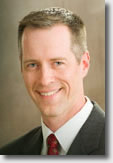
Dr. Mark E. Benden
Some 59 million Americans live in rural areas, many of them isolated from health care access. Dr. Mark Benden and his co-inventor Dr. Eric Wilke are developing an economical three-wheeled, medical transport scooter known as the AmbiCycle™ that could reach patients in places traditional ambulances can’t. Benden explains, "I see this as an option for rural patients who need emergency transportation but can’t get it from traditional EMS." Benden and Wilke also envision the AmbiCycle™ in a variety of other settings, including congested urban areas (where gridlock stalls traditional ambulances), military deployments, commercial locations such as refineries, and as a low-cost alternative in underdeveloped nations.
Benden and Wilke have applied for a patent and are seeking investors to manufacture the novel design that is under 36" wide, operated by just one person and costs less than $2,000.
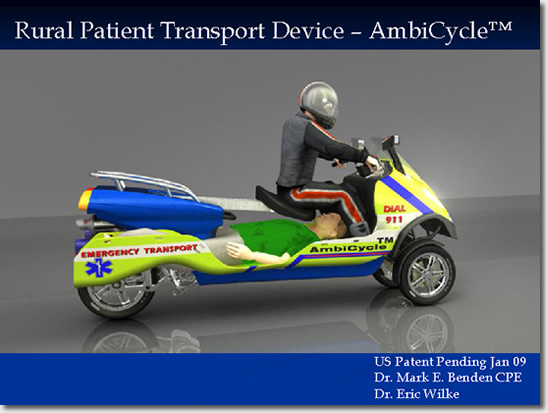
Drs. Benden and Wilke's invention, the Ambicycle™, will offer safe, low-cost transport of patients in areas where traditional ambulances are unaffordable or otherwise not feasible.
[ Top ]
Completed UTCM Projects
More information and final reports on these and other completed projects can be found on the menu at top left under Projects: Completed Projects.
RESEARCH
"Expansion of the Border Crossing Information System"
J. Villa and R. Aldrete • 2/1/08 - 1/31/09
"Improved Demand-Response Productivity and Service Quality Through Dispatch Strategies"
S. Edrington and J. Arndt • 6/1/08 - 1/31/09
"Mileage-Based User Fees: Defining a Path Towards Implementation (Phase 1)"
G. Goodin • 10/1/08 - 2/28/09
[ Top ]



